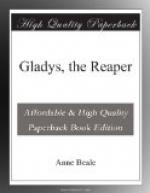‘You see Netta has all the grandest lady could desire,’ said Howel, before Mrs Prothero left.
‘Oh yes! I hope you will be happy,’ was the reply. Mrs Prothero had never given a thought to the grandeur by which she was surrounded.
‘Why not? Does Netta complain?’ said Howel.
’No, no; she says you are very good, and let her have all she wants; but, Howel, riches may not always bring happiness, and we must try to look beyond the perishable things of life for it.’
‘Pshaw!’ said Howel, impatiently; ’you know, aunt, I hate that sort of cant.’
Soon after she left Abertewey, Colonel Vaughan called Howel and he had a long conversation, the purport of which was, that the colonel wished to come himself to reside at Abertewey at the end of Howel’s term of two years; and Howel was quite ready and willing to give it up to him, saying that he meant to purchase a house in town—in Belgravia, of course—and to reside there until he could meet with a property that he could purchase.
Howel told Netta that he was tired of the neighbourhood already, it was so stupid; and that London, and a country house in some English county, would be far preferable to living in such a dull part of the world. She quite agreed with him, and had her own reasons for being glad to leave Wales. In the first place, she was not at home with the people she met in society, and liked the notion of living where no one would know that she was the daughter of the Protheros of Glanyravon. In the second, Howel would be always at home in London, and never again absent for three months, she knew not why. Moreover, she longed to be far away from the mother-in-law, who was a sort of spy over all she said or did; and she thought Howel would be kinder to her when he was at a distance from their kith and kin, whose propinquity seemed to irritate him.
Netta did not stop to consider Howel’s real reasons for leaving the country, or imagine for a moment that a man of his, to her, inexhaustible resources, could be induced to do so because he found those resources were not inexhaustible. Neither did she remember that in London he would be in the midst of the gamblers, horse-racers, and spendthrifts who had been helping him to diminish his father’s ill-gotten gains, before and since, he came into possession of them.
During the remainder of his stay in the county, his house was open to sportsmen of every grade. His racers, hunters, hounds, and good dinners were points of union to all the sporting men of the county; and Captain Dancy, Mr Deep, Sir Samuel Spendall, the Simpsons, Madame Duvet, and many others, again adorned Plas Abertewey. Races and race-balls, steeple-chases, and steeple-chase balls, hunts, and hunt-balls, took Howel, Netta, and his friends from place to place, and he and his horses soon became celebrated. The latter ran at all the races. He was a good rider, and rode himself in several steeple-chases; in short, he was declared to be ‘a capital fellow!’ and one who, if he would only remain in the county, would raise the sporting interest throughout it. As ‘blessings brighten as they take their flight,’ so Howel’s popularity reached its zenith just as he resigned Abertewey to Colonel Vaughan, and went, with his wife and child, abroad for a few months.




